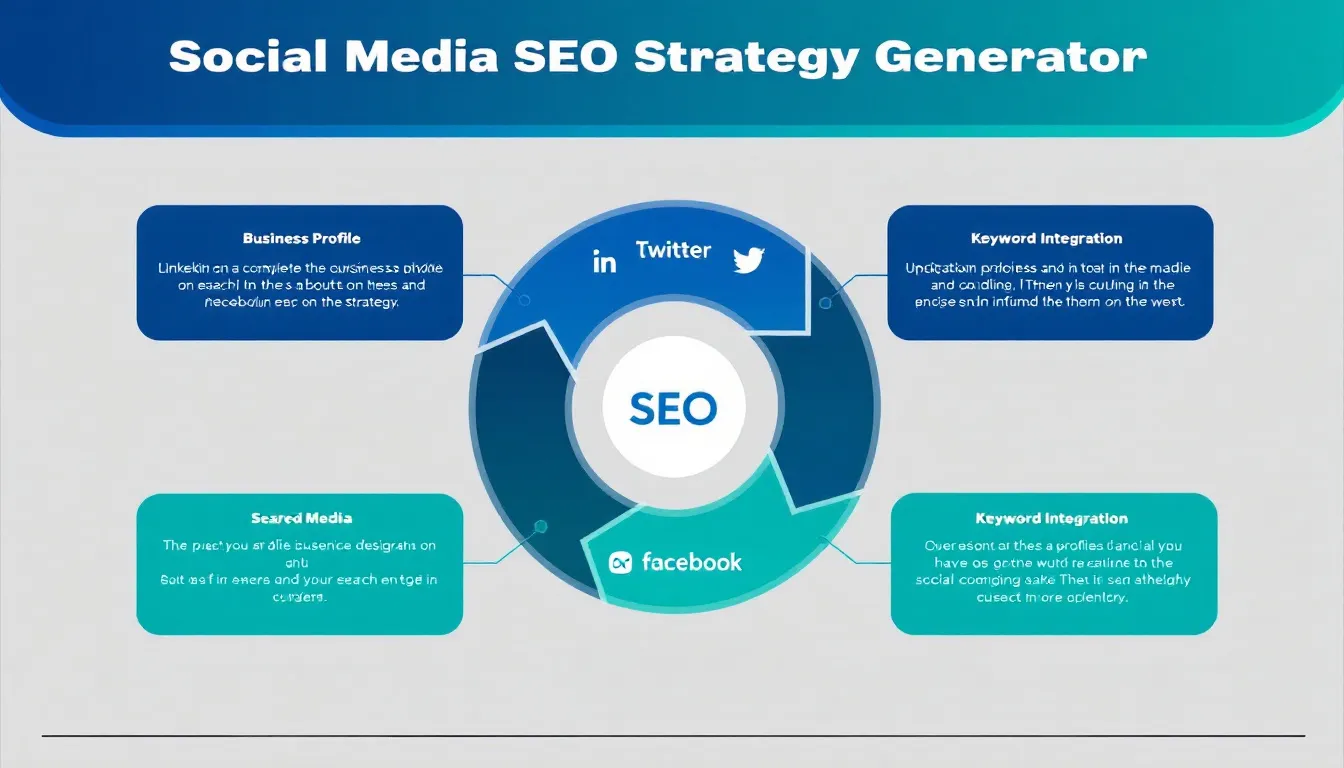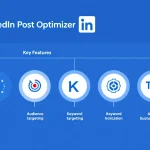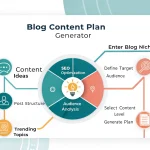Social Media SEO Strategy Generator
Generating your strategy...
Is this tool helpful?
How to Use the Social Media SEO Strategy Generator Tool Effectively
To maximize the effectiveness of our Social Media SEO Strategy Generator, follow these step-by-step instructions for each field:
1. Business Name Entry
Enter your complete business name as it should appear across social platforms. For example:
- Sample Input 1: “Mountain View Wellness Center”
- Sample Input 2: “TechStack Solutions International”
2. Industry/Niche Specification
Input your specific industry or business sector. Be as precise as possible:
- Sample Input 1: “Holistic Health and Wellness”
- Sample Input 2: “Enterprise Software Development”
3. Target Keywords
List your primary keywords, separated by commas. For optimal results, include:
- 3-5 primary keywords
- 2-3 long-tail keywords
- 1-2 location-based keywords (if applicable)
4. Target Audience Description
Provide detailed demographic and psychographic information about your ideal customers:
- Age range
- Professional background
- Interests and pain points
- Online behavior patterns
5. Social Platform Selection
List your preferred social media platforms in order of priority.
Understanding the Social Media SEO Strategy Generator
This advanced tool combines social media optimization with SEO principles to create a comprehensive digital marketing strategy. It analyzes your inputs to generate customized recommendations that align your social media presence with your SEO goals.
Core Components
- Keyword integration strategies
- Platform-specific content recommendations
- Audience engagement tactics
- Cross-platform optimization techniques
Benefits of Using the Social Media SEO Strategy Generator
1. Enhanced Online Visibility
The tool helps create a cohesive online presence by:
- Aligning social media content with SEO objectives
- Improving brand consistency across platforms
- Increasing organic reach through optimized content
2. Time and Resource Optimization
Users benefit from:
- Automated strategy development
- Platform-specific content recommendations
- Integrated keyword planning
3. Data-Driven Decision Making
The tool provides:
- Industry-specific insights
- Audience-targeted recommendations
- Platform optimization guidelines
Solving Common Social Media SEO Challenges
Challenge 1: Content Integration
The tool addresses the complex task of integrating SEO keywords into social media content naturally by providing:
- Platform-specific content frameworks
- Keyword placement suggestions
- Engagement optimization tips
Challenge 2: Cross-Platform Consistency
Users receive guidance on maintaining brand consistency while adapting to different platform requirements through:
- Platform-specific content guidelines
- Branding consistency recommendations
- Cross-posting strategies
Practical Applications and Use Cases
Case Study 1: Local Business Optimization
A local fitness studio used the tool to enhance their social media presence:
- Input: “FitLife Studio”
- Industry: “Personal Training and Fitness”
- Keywords: “personal training downtown, fitness classes, weight loss programs”
- Result: 40% increase in local social media engagement
Case Study 2: E-commerce Integration
An online retailer improved their social commerce strategy:
- Input: “GreenLeaf Organics”
- Industry: “Organic Food E-commerce”
- Keywords: “organic food delivery, natural ingredients, sustainable food”
- Result: 65% increase in social media-driven website traffic
Frequently Asked Questions
Q: How many keywords should I include in my strategy?
A: For optimal results, include 5-7 primary keywords and 3-4 long-tail keywords that specifically relate to your business and target audience.
Q: Which social media platforms work best for B2B companies?
A: LinkedIn and Twitter typically yield the best results for B2B companies, followed by Instagram for brand awareness and company culture showcasing.
Q: How often should I update my social media SEO strategy?
A: Review and update your strategy quarterly to maintain relevance and adapt to changing market conditions and platform algorithms.
Q: Can I use the same content across different social platforms?
A: While core messages can remain consistent, it’s recommended to adapt content format and tone for each platform’s unique characteristics and audience expectations.
Q: How do I measure the success of my social media SEO strategy?
A: Track key metrics including engagement rates, click-through rates, social media referral traffic, and keyword ranking improvements for social media profiles.
Q: Should I focus on all social media platforms at once?
A: Start with 2-3 platforms where your target audience is most active, then expand based on performance and resource availability.
Q: How can I optimize my social media profiles for SEO?
A: Include relevant keywords in your profile descriptions, maintain consistent branding, and regularly share optimized content that links back to your website.
Q: What types of content work best for social media SEO?
A: A mix of educational content, visual elements, user-generated content, and industry insights typically performs best while supporting SEO objectives.
Important Disclaimer
The calculations, results, and content provided by our tools are not guaranteed to be accurate, complete, or reliable. Users are responsible for verifying and interpreting the results. Our content and tools may contain errors, biases, or inconsistencies. We reserve the right to save inputs and outputs from our tools for the purposes of error debugging, bias identification, and performance improvement. External companies providing AI models used in our tools may also save and process data in accordance with their own policies. By using our tools, you consent to this data collection and processing. We reserve the right to limit the usage of our tools based on current usability factors. By using our tools, you acknowledge that you have read, understood, and agreed to this disclaimer. You accept the inherent risks and limitations associated with the use of our tools and services.







